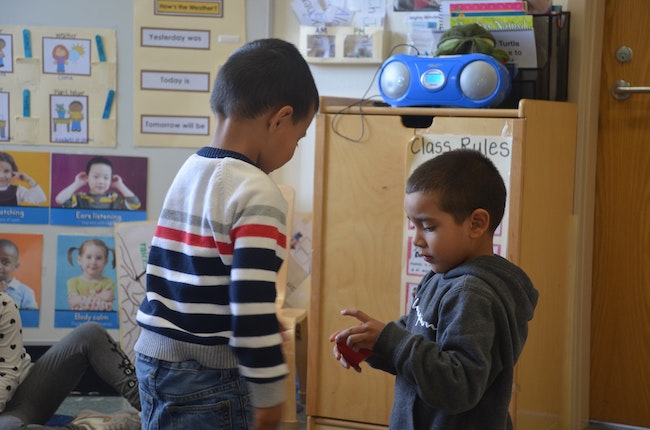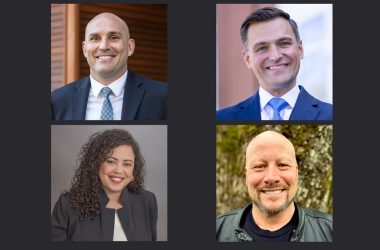 Preschool students play in a Salem-Keizer classroom at the East Salem Community Center on Oct. 22, 2019 (Rachel Alexander/Salem Reporter)
Preschool students play in a Salem-Keizer classroom at the East Salem Community Center on Oct. 22, 2019 (Rachel Alexander/Salem Reporter)
Oregon will spend millions of dollars to allow thousands more kids to attend preschool next fall, including tripling the size of a free program for middle-income families.
The money could help hundreds of Salem-area families who struggle to pay for preschool or find a spot in a free program.
Ester Hurtado pays $210 a month to send her son, AJ, to preschool at Hayesville Elementary School part time three days a week.
AJ was in full-day preschool five days a week, but the family couldn’t afford to spend nearly $700 a month after Hurtado’s husband was laid off.
“That is kind of outrageous for our family. That’s like a whole paycheck,” she said.
[ Help build Salem Reporter and local news – SUBSCRIBE ]
Even with two incomes, they struggled to afford it.
The change in her family’s income means Hurtado is eligible for Preschool Promise, a three-year-old Oregon program that provides free all-day preschool to four-person families earning up to $51,500 per year.
Even with help, there aren’t enough slots to meet demand. AJ is one of 225 local kids waiting for a spot.
This time last year, there were about 140 families on the waitlist for Salem-Keizer’s Preschool Promise program.
“Having that huge number at the beginning of the year is showing the need,” said Samantha Miley, the district’s assistant coordinator for early childhood programs.
Other district preschool programs, which include free options for some elementary schools and low-income families, are also full or close to it.
Across Marion and Polk counties, nearly 500 kids are waiting for a spot in either Preschool Promise or Head Start. The region has 2,130 publicly-funded preschool spots, said Lisa Harnisch, executive director of the Marion Polk Early Learning Hub.
The $2 billion education package Oregon legislators passed in the spring included $200 million per year to expand preschool and other programs for families with young kids. State officials expect the new programs to reach about 15,000 kids.
That money will allow 2,565 more kids to attend Preschool Promise in Oregon, up from just 1,300 currently, said Melanie Mesaros, spokeswoman for the Oregon Department of Education’s early learning division. School district, early learning hubs and other preschool providers can apply for state money to hire staff and pay for operating costs.
A 2018 report by the Children’s Institute, a Portland-based organization that advocates for early childhood education, estimated 30,000 Oregon kids are eligible for Preschool Promise, though there’s nowhere near enough space for all of them.
State money will also add spots in Head Start, free preschool for low-income families, and add preschool programs for young children with disabilities and special needs.
Educators are increasingly focusing on preschool as one way to close gaps in academic achievement between kids from wealthier families and their lower-income peers. Those gaps are clear by the time students reach kindergarten, when wealthier students already recognize more letters and numbers.
Harnisch said interest in the programs has grown as more families have learned about the importance of preschool. Preschool Promise has also made free classes available to families who earn more than the federal poverty line.
“A lot of families don’t qualify for that yet are still in need,” she said.
 A girl plays with trains in a Salem-Keizer preschool classroom at the East Salem Community Center (Rachel Alexander/Salem Reporter)
A girl plays with trains in a Salem-Keizer preschool classroom at the East Salem Community Center (Rachel Alexander/Salem Reporter)
Jamie Werndli, a stay-at-home Keizer mom who studied elementary education, said she’s well-equipped to read with her 3-year-old son and help him be prepared academically for kindergarten.
But she’d still like him in a preschool class to be with kids his age and get used to a classroom.
“You learn from other people. Other kids ask questions, you learn from what they’re asking. When it’s just me and him, there’s only so much outside influence,” she said.
Her family has looked at paid preschool options, but hasn’t found anything that works because of the cost, transportation logistics or both.
Even the most modest programs are expensive. The Salem-Keizer School District charges $170 a month for five hours of preschool a week.
Hurtado said she’s seen benefits for AJ from his preschool classes. He’s more confident engaging with other students and his social anxiety has decreased.
“He developed a friendship with this older preschooler,” she said. The girl was able to “be his bigger sister basically, be his best friend. That friendship really helped him get out of his shell.”
This year, he was excited to go back and be an older friend to the newer students.
The Early Learning Hub is holding focus groups this week to hear from parents about what they’d like to see in expanded preschool programs:
Wednesday, Nov. 13 13, 2019 6:00 – 8:00 pm Oregon Child Development Coalition 535 G Street Independence, OR 97351 Facilitated in Spanish only.
November 13, 2019 6:00 – 8:00 pm Oregon Child Development Coalition 540 North Settlemier Ave. Woodburn, OR 97071 Facilitated in English only.
November 14, 2019 6:00 – 8:00 pm Academy Building 182 SW Academy St. Dallas, OR 97388 Facilitated in English only.
November 18, 2019 6:00 – 8:00 pm AC Gilbert House Museum 116 Marion St. NE Salem, OR 97301 Facilitated in English only.
November 19, 2019 5:30 – 7:30 pm Stayton Public Library 515 North First Ave. Stayton, OR 97383 Facilitated in English only.
Reporter Rachel Alexander: [email protected] or 503-575-1241.

Rachel Alexander is Salem Reporter’s managing editor. She joined Salem Reporter when it was founded in 2018 and covers city news, education, nonprofits and a little bit of everything else. She’s been a journalist in Oregon and Washington for a decade. Outside of work, she’s a skater and board member with Salem’s Cherry City Roller Derby and can often be found with her nose buried in a book.









